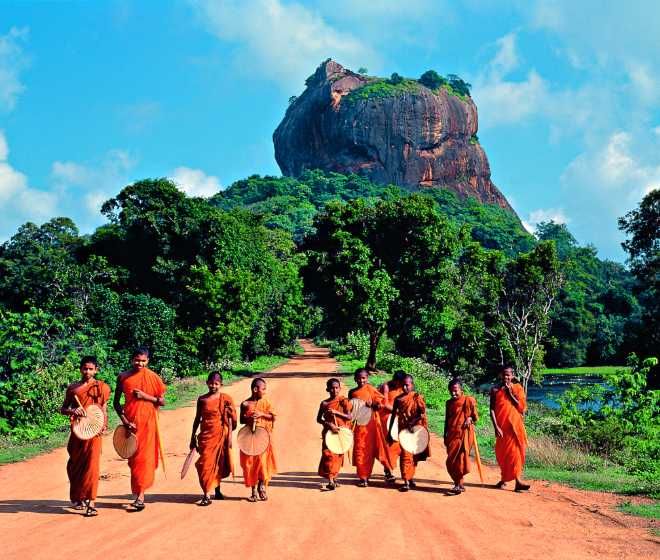
Sinhala and Tamil New Year
Many countries in the world celebrate the new year in 1st of January. Yet there are several calendars around the world that celebrates different days to welcome New Year. In Sri Lanka, new year celebrations start on 13th of April and end in 14th of the month. Sinhala and Tamil New Year. The biggest celebration in Sri Lanka that features a load of rituals and customs is one of the must things to experience in your holiday on the island. Based on the sun’s movement from the Meena Rashiya (House of Pieces) to the Mesha Rashiya (House of Aries) Sri Lankan welcomes the new year in April with a lot of firecrackers, fireworks and gourmet of traditional sweets…

Also known as the sun festival, the Sinhala and Tamil new year is a ritual performed to honour the God of Sun for hundreds and hundreds of years now.
Comes with such a long history the festival is the best season to experience Sri Lanka’s core traditions and rituals and to enjoy fun activities and traditional games at the same time that you cannot experience anywhere else.

Sinhala and Tamil New Year Rituals The unique rituals and the traditions are what make Sinhala and Tamil new year special and memorable. Neutral period (Nonagathe) The new year rituals start in 13th with a ritual called neutral period or Nonagathe. During this time people keep off from all the work and do nothing but engage in religious activities to get the blessing of their religion to prepare for the new year.
Sinhala & Tamil New Year Rituals

Lighting the hearth (Lipa gini melaweema)
Once the dawn of the new year comes the first ritual of Sri Lankans is the lighting the hearth of the house to prepare milk rice a must have a traditional dish on the new year feast that symbolises prosperity.
First meal at the Avurudu table (Ahara anubawaya)
Food plays a major role in new year celebrations in Sri Lanka. A huge table with Kiribath, bananas, sweets like kavum, kokis, thalaguli, aggala, aasmi, aluwa and many other traditional sweets become the centrepiece of any house. Every family in Sri Lanka enjoys the feast at an auspicious time after lighting an oil lamp. Starting work and exchanging money (Weda alleema saha ganu denu kireema) Once the family finishes the new year meal people do some work to symbolise starting to work in the new year. This ritual is called weda ellima. Next people perform transactions among family members and other respected parties and even with the well to thank for the clear water it had provided you during the last year. Anointing oil (Hisa thel gaama) Here a series of oils are anointed on peoples’ heads young and old to bless with health and healing.
All these rituals are performed during an auspicious time. Meaning the entire country cooks, eats and engages in work at the sometime. The Tamils also celebrate the New Year that commonly known as ‘Puththandu’. Their new year also has traditions and rituals practised over the years which are slightly different to those of the Sinhalese.
Sinhala and Tamil New Year Sweets
You cannot speak about Sinhala and Tamil new year without having to talk about food. Which is why tasting new year sweets is a must thing to do during your April holiday in Sri Lanka. Below are some of the sweets you should try during the new year season. Konda Kewum- Made with coconut trickle and rice Konda Keum is a deep fried fluffy cake. Kokis A deep-fried, crispy sweet made from rice flour and coconut milk Asmi A crunchy traditional sweet topped with a traditional caramel syrup Mon kewum -A diamond-shaped sweet that comes with a crunchy crust with a sweet paste of sweetened green grams inside.
Avurudu Music and games Sinhala and Tamil new year is a season it’s all about family-focused celebrations. During this season people work in cities return to their hometown or village and celebrates the new year with their extended family. Fun games and activities also play an important part in new year celebrations.
Playing the Rabana Rabana is a large drum people sit around and play during happy occasions. This is mainly played by elderly females and sometimes involves dancing as well.
Traditional board games Olinda Keliya and Pancha Demima are two board games mostly Sri Lankan ladies play during this season which involves two or more players. All the items used in such games are natural. For an example, boards of the games are made of wood and use plant seeds and seashells to play.
New year festival games During this season, the whole village gets together and organize events that include many traditional games to celebrate the season and children and elders alike enjoy participating in such events. Some of the new year games played in new year events are Placing the eye on the elephant- (Aliyata asa thabeema) Eating buns (Banis kema) Pillow-fight – (Kotta Pora) Tug-o-War-(Kamba Adeema) Breaking the pots – (Kanamutti bindeema) Climbing the greasy pole – (Lissana gaha nageema)



